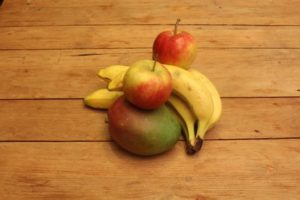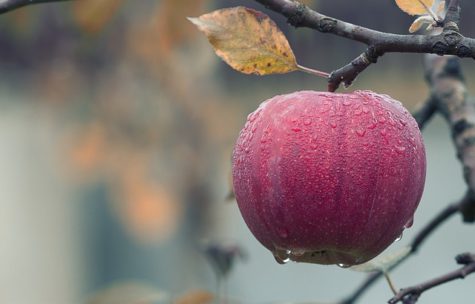LONDON — Can you tell an apple from a mango? Seems easy enough, but for a whopping 40 percent of people in the United Kingdom, it’s apparently quite the head-scratcher. In fact, fruit identification poses a great challenge for many people, according to the results of a new survey.
Yeo Valley, a family-owned dairy and yogurt company in England, commissioned a poll of 2,000 adults in the UK to test their knowledge of common, and not-so-common produce. The results were more stunning than many might expect.

Among the findings, 70% of respondents couldn’t tell the difference between a tangerine and an orange or clementine, and 20% didn’t know a tangerine from a grapefruit. A third had no idea what a fig looked like, and 1 in 10 “were perplexed” by a pomegranate.
And we hope they were kidding at the time, but 7% of respondents guessed “Halle Berry” when shown a mulberry.
Dan Rusga, marketing director for Yeo Valley, says the company sought to see how well people knew their fruits ahead of the release of their new yogurt with baobab, a lesser-known citrus fruit found in Africa and Australia that is typically served in powder form. Only a quarter of respondents recognized the baobab.
“We knew that baobab might not be well known when we added it to our yogurt. But we were very surprised by the number of people mixing up apples and mangos, it’s tough to compare apples with apples when you’re looking at a mango,” he admits Rusga in a release.
Knowing whether a food was a fruit or vegetable also posed a challenge. Three-quarters of those surveyed thought olives and pumpkins were vegetables, while 40% thought the same about an avocado.
Meanwhile, where fruit comes from was just as difficult for plenty of people.
Half didn’t know that pomegranates grow on trees, and slightly less were surprised to learn watermelons are born on the ground. Similarly, about 30% never knew blueberries grew on bushes, while 20% correctly identified pineapples as fruits that come from the ground.
“If most people don’t know pineapples grow on the ground then this is a story we should be sharing with our customers,” says Rusga.
With all the confusion, it doesn’t seem so surprising that more than 15% said they don’t each fruit on a daily basis, and more than one in five admitted they weren’t well-versed in basic fruit knowledge.
As for the most unidentifiable fruit in the survey? That award goes to the Feijoa, with just 15% of those surveyed correctly naming it.

4 in 10 are liberals.
This isn’t surprising considering the average IQ of middle eastern muslims is 81 which is borderline mentally retarded by white, western standards.
As long as white, western nations continue to import people from primitive, third world cultures, the quality of life of white western children will suffer.
No doubt Mommy does the grocery shopping.
They must be CNN viewers
Therefore, 4 in 10 people are morons.
9 out of 10 cats can differentiate an apple from a mango. The articledoesn’t say whether the people interviewed were sat with an actual live sample of the fruit in front of them, or if they had to interpret photos(without scale to indicate size) or even drawings that would (for example) appear on yogurt packages. Also, those whose arms are twisted into doing a long survey often stop answering questions with care when they get annoyed.
This is the “fruit” of importing endless waves of people into your country who have never seen a fruit before because they live in a desert hellhole. Good luck with that.
“…but for a whopping 40 percent of people in the United Kingdom, it’s apparently quite the head-scratcher.”
Not a coincidence then that Great Britain has transformed into Britanistan in just the last few years.
Its Bush’s fault!!! I mean…. its Trumps fault!!!
that line belongs to Nancy Pelosi!
It’s nice that out country is known for flakes that take stress days, kids that eat tide pods, and now morons that don’t know fruit….
Good work…
‘our country’ is also known for high illiteracy as noted in the content of the FIRST SENTENCE. the study refers to the UK.
HA HA!!! Snared by my old foe Auto Correct….damn you grammar.
The question about how pineapples grow is a matter of interpretation. Technically, they do NOT grow on the ground, as a watermelon or pumpkin does. Pineapples grow on stalks several inches above ground.
What? This has got to be fake. How in the world can you mistake an apple with a mango? They are completely different and have a different taste. I guess the 4 in 10 are Democrats.
https://dannwoellertthefoodetymologist.wordpress.com/2016/01/18/the-midwest-mango-green-pepper-mystery/ Don’t be so cocky.
If this doesn’t show that education has gone to Hell I don’t know what does.
its simple really, the apple costs $1000
To be fair, some of those fruits are very regional. Mullberries are tough one since there are some cities that flat out ban the trees. And this is London. I would guess they don’t get as much citrus as the US does. I doubt some small town is going to get a wide variety of fruits in their supermarket.
well, to be perfectly honest, has anyone ever heard ‘fine dining’ and ‘british food’ used in the same sentence? these are people that make pie out of kidneys.
I’ve been to the UK many times, the average citizen is an idiot. Those are some dumb human beings.
Fake fruit news
I don’t know what a clementine is either. But the rest of this, I’d probably get right. Tangerines, mandarins, oranges, apricots I’v been known to confuse a bit.
But not knowing a pomegranate or mango? Feijoa’s are great but I’ve only been acquainted with since I’ve been in New Zealand.